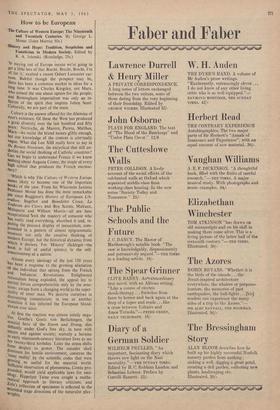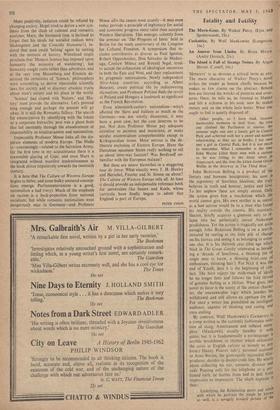How to be European
The Culture of Western Europe: The Nineteenth and Twentieth Centuries. By George L. Mosse. (John Murray 50s.) History and Hope: Tradition, Scepticism and Fanaticism in Modern Society. Edited by K. A. Jelenski. (Routledge, 25s.) 'IF staying out of Europe means we're going to get a little less of that Brecht, Brecht, Brecht, I'm all for it,' exulted a recent Osbert Lancaster car- toon. Baleful though the prospect may be, there has been a common market in ideas for a long time. It was Charles Kingsley, not Marx, who coined the one about opium for the people; and Birmingham imperialism was only an in- flation of the spirit that inspires Julien Sorel. Culturally, we are part of the main.
Culture is the answer offered for the dilemma of man's existence. Of these the West has produced a great diversity over the last hundred and fifty Years: Nietzsche, de Maistre, Pareto, Malthus, Marx—we recite the brand names glibly enough, but our knowledge of the content is criminally Vague. What did Leo XIII really have to say in De Rerum Novarutn, the encyclical that still un- "derlies the social thinking of Catholic countries? Can we begin to understand France if we know ugh about Auguste Comte, the staple of every 'nigh school that produces the French meritoc- racy?
Which is why The Culture of Western Europe seems likely to become one of the important books of the year. From his Wisconsin fastness Professor Mosse has done the most remarkable 'job since Ruggiero's History of European Lib- eralism. Bagehot and Benedetto Croce, La Trahison des Clercs and Boy Scouts, Malraux, Malaparte and William Morris—all are here recapitulated With the mastery of someone who has really read everything, absorbed it and, re- jecting the peacock display of inessentials, com- Pounded in a pattern of almost epigrammatic terseness not only the creative thinking of 'Modern Europe, but the historical dynamic from Which it derives. For 'History' (Schlegel—the book is full of useful quotes) 'is the self- eonsciousness of a nation.'
Almost every ideology of the last 150 years has been a response to the growing alienation iof the individual that sprang from the French and Industrial Revolutions. Enlightened rationalism being exploded, the appeal lay to eternal forces comprehensible only by the emo- tions: escape from a changing world to the super- reality of inner man. We dedeive ourselves in utscounting romanticism; in one or another Mutation it has infected the European blood- stream ever since.
.At first the reaction was almost totally nega- tive. Goethe's Goetz von Berlichingen, the seminal hero of the Sturm and Drang, dies defiantly under God's free sky, in tune with nature and against society; scarcely a heroine to early nineteenth-century literature lives to see her twenty-third birthday. Later the stress shifts from despair to power. The outsider shall 'd.orninate his hostile environment, construe the inner reality' by the scientific codes that were proving so useful for the material world. Sufficient observation of phenomena, Comte pro- Plaunded, would yield applicable laws for soci- (mogY. Hippolyte Taine even sought a mathe- Tatical approach to literary criticism; and .f °la's collection of specimens is reflected in the extended stage directions of the naturalist play- More positively, isolation could be refuted by changing society. Hegel tried to derive a new syn- thesis from the clash of rational and romantic analyses; Marx, the humanist (one is inclined to forget that his ideals for socialist realism were Shakespeare and the Comedie Humaine!), in- sisted that man could `belong' again by uniting with the motions of history. Whitehead might proclaim that 'Modern Science has imposed upon humanity the necessity of wandering'; but humanity sought roots rather than adventure, and at the very time Heisenberg and Einstein de- stroyed the certainties of 'Science,' philosophers were scrambling to derive immutable scientific laws for society and so discover absolute truths about man's nature and his place in the world.
`Science' had eloped with 'Nature,' and 'His- tory' must provide the alternative. Let's pretend long enough and perhaps the present will go away. It is still the Romantic fallacy. The search for emancipation by identifying with the future or a corporate hierarchic past was a ghost hunt that led inevitably through the abandonment of responsibility to totalitarianism and nationalism, Impeccably Professor Mosse links all the dis- parate elements of modern Europe. The Mafia is—convincingly—related to the Salvation Army; for the first time in my acquaintance there is a reasonable placing of Gide; and even Marx is integrated without manifest tendentiousness as the book drives impulsively towards the twentieth century.
It is here that The Culture of Western Europe begins to falter, and some bulky unstated assump- tions emerge. Parliamentarianism is a good, nationalism a bad (very). Much of the emphasis on racism is a back-projection from national socialism; but while romantic nationalism went dangerously sour in Germany—and Professor
Mosse sifts the causes most acutely—it may even today provide a principle of legitimacy for social and economic progress more valid than accepted Western liberalisms. This emerges saliently from the seminar on `The Progress of Ideas' held in Berlin for the tenth anniversary of the Congress for Cultural Freedom. A symposium that in- cludes contributors as diverse as Paul Ignotus, Robert Oppenheimer, Don Salvador de Madari- aga, Czeslaw Milocz and Ronald Segal, tends to accept the exhaustion of ideological incentives in both the East and West, and their replacement by pragmatic nationalisms. Newly independent Afro-Asian countries, according to Albert Hourani, create political life by rediscovering themselves; and Professor Polyani finds the revolt of Poland and Hungary.a landmark as significant as the French Revolution.
Even nineteenth-century nationalism—which affected the Slays and Italians as much as the Germans—was not wholly disastrous; it may have a poor case, but the case deserves to be put. Nor does Professor Mosse pay adequate attention to painters and musicians, or make secular existentialism comprehensible except in Kirkegaardian terms. More serious is the de- liberate exclusion of Eastern Europe. Have the Danubian successor States really nothing to tell us about inter-war fascism? Was Berdyaeff un- familiar with the European malaise?
But these are minor blemishes in a staggering tour de force. What exactly were T. H. Huxley and Herschel, Fourier and St. Simon on about? The Culture of Western Europe tells all. At least it should provide an indispensable reference book for universities like Sussex and Keele, whose curricula have finally begun to admit that England is part of Europe.
PETER FISON







































 Previous page
Previous page